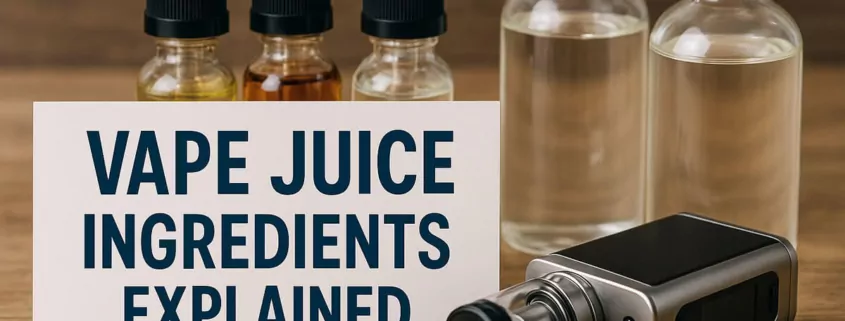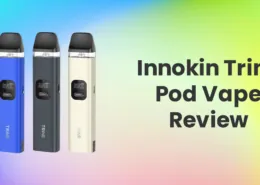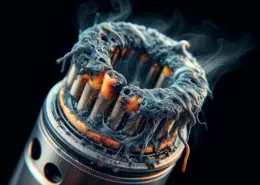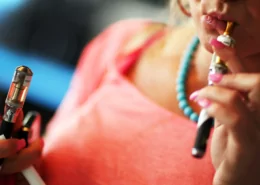Vape Juice Ingredients Explained: What’s Really in Your E-Liquid?
If you’re new to vaping or even a seasoned user, you’ve likely wondered about the liquid that creates those flavorful clouds: vape juice, also known as e-liquid or e-juice. Understanding its components is crucial for making informed choices about your vaping experience, from the intensity of the throat hit to the density of the vapor and, most importantly, what you’re inhaling. While the media sometimes portrays vape ingredients as a mysterious concoction, most e-liquids are actually made from a relatively small number of core components. This guide will break down these ingredients, explore their properties, discuss safety considerations, and help you understand how they combine to create your unique vape.
The Fundamental Building Blocks: Core Vape Juice Ingredients
At its heart, the vast majority of e-liquid on the market consists of just a few primary ingredients. While water can sometimes be a minor component, the main players are:
- Propylene Glycol (PG)
- Vegetable Glycerin (VG)
- Flavorings
- Nicotine (optional)
Let’s explore each of these in more detail.
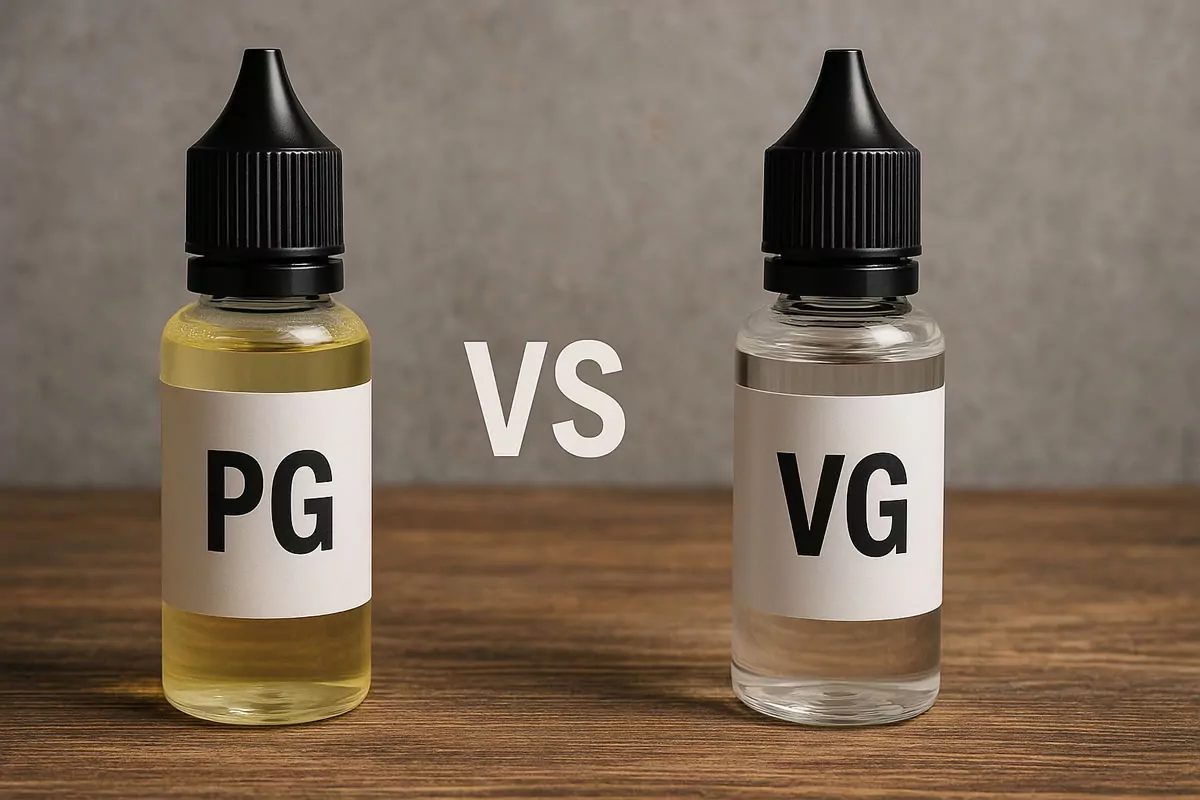
Propylene Glycol (PG): The Flavor Carrier & Throat Hit Provider
Propylene Glycol (PG), chemically 1,2-propanediol, is a synthetic organic compound. It’s a colorless, nearly odorless liquid with a faintly sweet taste. You’ve likely encountered PG in many everyday products, as it’s widely used in the food, pharmaceutical, and cosmetic industries. The U.S. Food and Drug Administration (FDA) classifies PG as “Generally Recognized as Safe” (GRAS) for oral consumption1. Its applications include:
- A solvent and carrier for flavors and colors in food products.
- A humectant (moisture retainer) in cosmetics, food, and toothpaste.
- An active ingredient in theatrical smoke machines to create “fog.”
- A solvent in some medications, including oral, injectable, and topical formulations.
In vape juice, PG primarily serves to:
- Carry Flavor Effectively: PG is thinner than VG and is an excellent solvent, meaning it carries flavor concentrates very well, leading to a cleaner, more defined taste profile.
- Provide a “Throat Hit”: Many former smokers appreciate the sensation at the back of the throat when inhaling, which PG helps to replicate. A higher PG ratio generally results in a stronger throat hit.
- Produce Less Vapor: Compared to VG, PG produces thinner, less dense vapor clouds that dissipate more quickly.
- Wick Efficiently: Its lower viscosity allows it to be absorbed by the wicking material in vape coils more easily, which can be beneficial in smaller devices or those with tighter wicking channels.
While GRAS for ingestion, the long-term effects of inhaling aerosolized PG are still a subject of ongoing research. Some individuals may experience minor throat irritation or dryness with high-PG liquids, and a small percentage may have a sensitivity or mild allergic reaction to PG2.
Vegetable Glycerin (VG): The Cloud Creator
Vegetable Glycerin (VG), or glycerol, is a natural chemical derived from vegetable oils (commonly palm, soybean, or coconut oil). Like PG, it’s a colorless, odorless liquid, but it’s significantly thicker (more viscous) and has a noticeably sweeter taste. VG is also GRAS-certified by the FDA and is a ubiquitous ingredient in:
- Food products as a sweetener, humectant, and thickener.
- Pharmaceuticals, often as a solvent or sweetening agent.
- Cosmetics and personal care items like lotions, shampoos, and soaps for its moisturizing properties.
In vape juice, VG is primarily responsible for:
- Vapor Production: VG’s thicker consistency and hygroscopic nature (ability to attract water) mean it produces significantly larger, denser vapor clouds when heated. This is why e-liquids designed for “cloud chasing” typically have a high VG content.
- Smoother Throat Hit: Compared to PG, VG provides a much smoother sensation on the throat, which many vapers prefer.
- Added Sweetness: VG’s inherent sweetness can contribute to the overall flavor profile of an e-liquid, sometimes enhancing sweet notes or subtly altering more complex blends.
The main considerations with high-VG liquids are that their thickness can sometimes lead to slower wicking in certain types of coils (potentially causing “dry hits” if not matched with appropriate hardware) and can cause more residue buildup on coils (“coil gunking”) over time, requiring more frequent cleaning or coil replacement. When heated to very high temperatures, VG can also decompose into acrolein, a respiratory irritant, though levels in typical vaping aerosols are generally much lower than in cigarette smoke3.
Understanding PG/VG Ratios
Most e-liquids contain a blend of both PG and VG, and the ratio significantly impacts the vaping experience. Common ratios include:
- High PG (e.g., 70PG/30VG, 60PG/40VG): Stronger throat hit, more intense flavor, less vapor. Best suited for lower-power devices, mouth-to-lung (MTL) vaping, and those prioritizing flavor clarity or a cigarette-like sensation.
- Balanced (e.g., 50PG/50VG): A popular middle ground offering a good balance of throat hit, flavor, and vapor production. Works well in a wide range of devices.
- High VG (e.g., 70VG/30PG, 80VG/20PG, Max VG): Smoother throat hit, much denser vapor clouds, potentially slightly muted or sweeter flavor. Ideal for higher-power devices, sub-ohm vaping, direct-to-lung (DTL) inhales, and “cloud chasing.”
Choosing the right ratio often comes down to personal preference and the type of vaping device being used.
Comparing the Two Bases:
| Propylene Glycol (PG) | Vegetable Glycerin (VG) |
|---|---|
| Strong throat hit | Smooth throat hit |
| Pure flavor | Added sweetness to flavor |
| Moderate vapor production | Thicker vapor clouds |
| Longer shelf life | Shorter shelf life compared to PG |
| Lower battery consumption | Higher battery consumption |
| Low maintenance and cleaning | Can cause buildups inside the tank |
| Potential allergies for some users | Natural and less likely to cause allergies |
Flavorings: The Art and Science of Taste
Flavorings are what give e-liquids their vast array of tastes, from simple fruits and menthols to complex desserts, beverages, and tobacco blends. These are typically food-grade flavor concentrates, often the same types used in the food and beverage industry. They can be natural (extracted from plants) or artificial (synthesized chemicals).
While these flavorings are considered safe for ingestion (eating), their safety when heated and inhaled is a more complex and less understood area. Some specific flavoring chemicals have raised concerns:
- Diketones (Diacetyl, Acetyl Propionyl, Acetoin): Diacetyl, known for its buttery flavor (famously used in microwave popcorn), was linked to a serious lung condition called bronchiolitis obliterans (“popcorn lung”) in factory workers who inhaled large quantities. While most reputable e-liquid manufacturers now avoid diacetyl, its substitutes like acetyl propionyl and acetoin have also faced scrutiny, and some may contain traces of diacetyl4.
- Cinnamon (Cinnamaldehyde): While a natural spice, cinnamaldehyde, the chemical responsible for cinnamon’s flavor, can be an irritant and has been shown in some studies to be potentially more toxic to cells in its inhaled form compared to other flavorings5.
- Vanillin (Vanilla): Similar to cinnamaldehyde, vanillin can be an irritant and may cause adverse reactions in some individuals when inhaled.
It’s important to purchase e-liquids from reputable manufacturers who are transparent about their ingredients (if possible, as many flavor recipes are proprietary) and ideally conduct testing for potentially harmful compounds. The sheer number of flavoring chemicals used and their potential interactions when heated makes this a challenging area for regulation and research6.
Nicotine: The Optional Addictive Component
Nicotine is the primary reason many adult smokers switch to vaping, as it allows them to satisfy their nicotine cravings without the thousands of harmful chemicals found in cigarette smoke. E-liquids come in a wide range of nicotine strengths, typically measured in milligrams per milliliter (mg/mL) or as a percentage (e.g., 6mg/mL is 0.6%). Strengths can range from 0mg (nicotine-free) up to 20mg/mL in regions like the UK and EU (due to TPD regulations), and sometimes higher (e.g., 25-50mg/mL with nicotine salts) in other markets like the US, though regulations are tightening.
There are two main forms of nicotine used in e-liquids:
- Freebase Nicotine: This is the traditional form of nicotine used in most e-liquids and nicotine replacement therapies. It’s more alkaline and can feel harsher on the throat at higher concentrations, providing a stronger “throat hit.”
- Nicotine Salts (Nic Salts): This form of nicotine is created by adding an acid (like benzoic acid) to freebase nicotine, resulting in a nicotine salt that is smoother to inhale at higher concentrations. Nic salts allow for rapid nicotine absorption, more closely mimicking the nicotine delivery of a cigarette, making them popular in lower-power pod systems and for new vapers.
It’s crucial to remember that nicotine is a highly addictive substance. While it’s not the primary cause of smoking-related cancers, it does have physiological effects, including increasing heart rate and blood pressure. Vaping products containing nicotine are intended for adult smokers seeking an alternative; they are not recommended for non-smokers or young people. Reputable e-liquid manufacturers use pharmaceutical-grade nicotine sourced from reliable labs to ensure purity and accurate concentrations.
What About Other “Scary” Sounding Chemicals?
Sometimes, ingredient lists or discussions about vape juice mention complex chemical names that sound alarming. For example, theobromine (C7H8N4O2) is simply the natural alkaloid found in cocoa that gives chocolate its characteristic flavor. Ascorbic acid is Vitamin C. Dihydrogen monoxide is water. It’s important not to be immediately alarmed by scientific names but to understand the context and source of the ingredient. However, this also underscores the need for transparency and rigorous testing by manufacturers to ensure no genuinely harmful contaminants or unlisted additives are present.
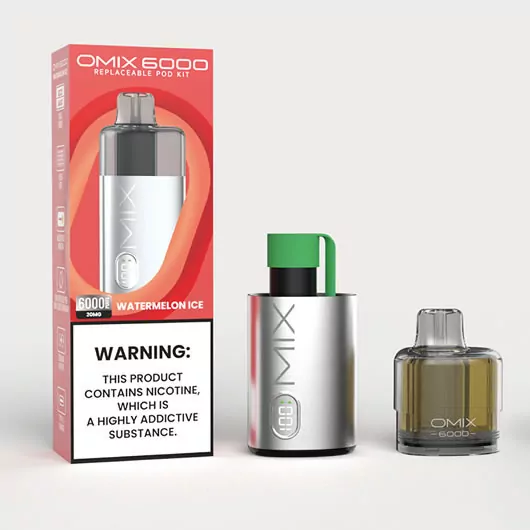
Ecigator OMIX 6000 (2+10ml) Pod Kit
The Ecigator OMIX 6000 is designed to be replaceable and rechargeable, and the ariflow is adjustable.
The kit comes with a 2ml prefilled pod and a 10ml E-liquid container, delivering up to 6000 puffs.
With the mesh coil technology, the OMIX 6000 will produces a consistent pure taste to ensure a superior vaping experience.
Choosing Your E-Liquid: Safety and Preference
With a better understanding of the core ingredients, you can make more informed choices:
- Source Reputable Brands: Purchase e-liquids from established, reputable manufacturers who are transparent about their ingredients and ideally provide lab reports (Certificates of Analysis) for their products. Avoid “mystery” or unbranded liquids.
- Consider PG/VG Ratio: If you prefer a stronger throat hit and intense flavor, a higher PG ratio might suit you. If you want smoother vapor and bigger clouds, opt for higher VG. A 50/50 blend is often a good starting point.
- Select Appropriate Nicotine Strength: If you’re switching from smoking, you might start with a strength that matches your previous cigarette consumption and gradually reduce it if desired. Heavy smokers might initially prefer higher strengths or nicotine salts. Lighter smokers or those looking to reduce nicotine might opt for lower freebase strengths or eventually nicotine-free (0mg) options.
- Be Mindful of Flavors: While flavor variety is a key appeal, be aware of the ongoing discussions around certain flavoring chemicals. If you have sensitivities, simpler flavor profiles might be better. The long-term inhalation effects of many complex flavor blends are still being studied.
Conclusion: Knowledge is Power in Your Vaping Journey
Vape juice, at its core, is a relatively simple formulation of PG, VG, flavorings, and optional nicotine. Each ingredient plays a specific role in creating the overall vaping experience. By understanding these components and their properties, you can better tailor your choices to your preferences for throat hit, vapor production, and flavor intensity. Crucially, always prioritize purchasing e-liquids from reputable sources that adhere to quality manufacturing standards and are transparent about their products. As research continues and regulations evolve, staying informed will help you navigate the world of vaping safely and enjoyably.
References:
- PubChem on Propylene Glycol – https://pubchem.ncbi.nlm.nih.gov/compound/Propylene-Glycol ↩︎
- ATSDR on Propylene Glycol – https://www.atsdr.cdc.gov/toxprofiles/tp189-c3.pdf ↩︎
- NCBI Bookshelf on Glycerol – https://www.ncbi.nlm.nih.gov/books/NBK507184/ ↩︎
- CDC on Flavorings-Related Lung Disease – https://www.cdc.gov/niosh/flavoring-related-lung-disease/about/?CDC_AAref_Val=https://www.cdc.gov/niosh/topics/flavorings/default.html ↩︎
- PMC Study on Flavoring Toxicity – https://pmc.ncbi.nlm.nih.gov/articles/PMC5954153/ ↩︎
- FDA on E-cigarette Ingredients – https://www.fda.gov/tobacco-products/products-ingredients-components/e-cigarettes-vapes-and-other-electronic-nicotine-delivery-systems-ends ↩︎
- Is It Illegal to Vape or Smoke While Driving in Minnesota? - August 15, 2025
- American Airlines Vaping Passenger Alleges Assault in Police Report - August 15, 2025
- NEXA PIX 35K Disposable Vape with Crystal Tank Review - August 15, 2025

